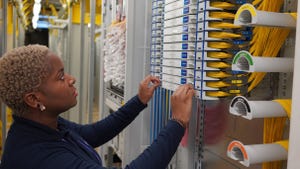VEON's Digital Overhaul Much More Than Rebranding
The world's seventh-biggest telco by customer numbers has made a new digital platform the very centerpiece of its strategy.

Ever since the mobile Internet became a reality in the early years of this century, telcos have been losing ground to Internet players. Efforts to claw back some of that territory have nearly always failed. Yet the latest salvo by the world's seventh-biggest operator stands a better chance than most.
Counting Russia as its largest market, VEON today has nearly a quarter of a billion customers spread across Europe, Africa and Asia. From a telco perspective, its subscriber base is about as diverse as they come, comprising a multitude of languages, socio-economic groups and cultural norms. But VEON now hopes to combine its experience and understanding of local circumstances with a global, Facebook-like approach to addressing its customers.
That starts with the name. Having previously been known as VimpelCom, and used various brands across its global operations (such as Beeline in Russia), the company renamed itself VEON earlier this year. It is now phasing out monikers that do not support this "mono-brand" strategy. The sale last month of its stake in Euroset, a retail joint venture in Russia with its MegaFon telco rival, plays into this approach. (See Eurobites: VEON Q2 Hit by Italian JV Losses.)
Figure 1: In the Digital Spotlight  Jean-Yves Charlier, VEON's CEO, is trying to make the emerging-markets operator a digital pioneer.
Jean-Yves Charlier, VEON's CEO, is trying to make the emerging-markets operator a digital pioneer.
But the VEON renaming is much more than just a branding exercise. It has been accompanied by the launch of a new digital platform: Once customers have downloaded the requisite app to their devices, they can access services from VEON as well as content partners like MasterCard and drinks company Red Bull. The short-term idea is to boost subscriber loyalty through better digital engagement with customers. But a VEON spokesperson confirms that revenue-sharing agreements with content partners are already active. The hope is that such tie-ups can become a major source of sales growth in the long term. (See VimpelCom to Pioneer 'Multivendor' NFV; Downbeat on 5G.)
Scoff though naysayers undoubtedly will, VEON's digital overhaul merits attention for several reasons. First and foremost, while digital transformation is often a behind-the-scenes activity that C-level executives seem barely to notice, this one is evidently a strategic priority. Addressing analysts during an earnings call last week, CEO Jean-Yves Charlier made it the number one item in his presentation. The objective, he said, was to "revolutionize the personal Internet experience for customers with the creation of the VEON platform," according to this Seeking Alpha transcript.
Similarly, the scale and scope of the overhaul go far beyond what most telcos have previously attempted. In principle, the app is now available to about 134 million of VEON's own customers using Apple Inc. (Nasdaq: AAPL) or Google (Nasdaq: GOOG) Android devices. While most of those customers cannot yet enjoy the full benefits, VEON has integrated the platform with its core systems for self-care, text messaging and telephony in five of its 14 markets -- Georgia, Italy, Pakistan, Russia and Ukraine. A "hard" launch is planned for September, and the bells-and-whistles version should be available across VEON's entire global footprint by the end of the year.
Next page: Organizational revamp
Organizational revamp
VEON is also developing an overarching strategy and organization that supports the new platform, instead of timidly holding back resources. The entire customer engagement process is set for radical change over the next 18 months, said Charlier during last week's earnings call, while some retail stores seem likely to get phased out. Data scientists working on the analytics and artificial intelligence that underpin the platform are becoming increasingly visible at VEON's offices.
Although not directly linked to the new platform, VEON's network investments in software and virtualization could also make it easier to provide services across multiple countries with fewer resources, and operate in a more web-like way. On the back-office side, meanwhile, VEON is spending about $1 billion with Sweden's Ericsson AB (Nasdaq: ERIC) to move business support systems in 11 markets onto a single cloud-based system. The plan is to cut IT spending in half, which would mean investing just 2% of Group revenues in this area in future. (See Mainly-Mobile VimpelCom Has Big Fixed Plans and VimpelCom Aims for BSS Overhaul by 2019.)
No doubt, the big challenge for VEON will be persuading customers to use its platform, and its partners' services, rather than Facebook or another high-profile Internet offering. But in many of these emerging markets, VEON's subsidiaries -- with their local expertise and tie-ups -- are arguably in a stronger position than the web giants. "They have an advantage over a Facebook that comes in from California and offers something that might not suit," insists VEON's spokesperson.
For all the latest news from the wireless networking and services sector, check out our dedicated mbile content channel here on Light Reading.
Clearly, a full transition to the VEON brand will have to be carefully managed to ensure customers do not defect. Moreover, Internet telephony and messaging services from VEON and its content partners could chew into revenues from traditional offerings. That risk is one that all operators must face, however, as the mobile Internet becomes pervasive. The rationale is that it is better to lose some revenues but retain a service relationship with customers than to be shunted aside completely.
Telco battles against Internet players have already been fought and lost in most developed consumer markets. The same cannot be said of many of the emerging markets in which VEON operates. And as a conduit to digital offerings from other companies, VEON can position itself as an important channel partner instead of an outright competitor. It already claims to have signed up about 100 content partners in total, including big-name brands like Deezer for online music and Vivendi for TV. Such alliances should help to fuel customer interest.
None of this guarantees success, and some previous telco efforts were said to hold similar attractions only to fall apart eventually. VEON's progress should at least be much easier to monitor from an early stage, with Charlier anticipating measurable benefits including a reduction in churn, customer acquisition costs and calls to customer care. During the recent earnings calls, when a Credit Suisse analyst asked for concrete indications of interest in the new platform, Charlier promised to provide "meaningful data" from September onward. Having put its platform so firmly under the spotlight, VEON will struggle to hide any shortcomings.
— Iain Morris, 

 , News Editor, Light Reading
, News Editor, Light Reading
About the Author(s)
You May Also Like




.jpg?width=300&auto=webp&quality=80&disable=upscale)







